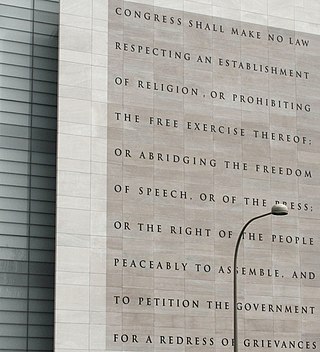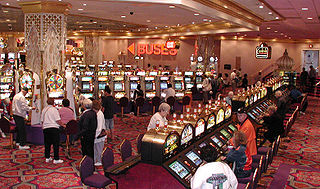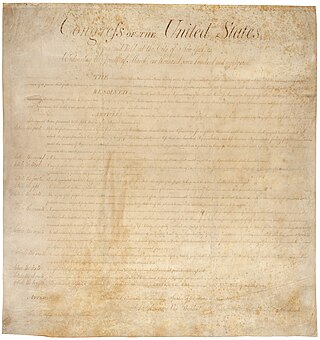
The First Amendment to the United States Constitution prevents the government from making laws that regulate an establishment of religion, or that prohibit the free exercise of religion, or abridge the freedom of speech, the freedom of the press, the freedom of assembly, or the right to petition the government for redress of grievances. It was adopted on December 15, 1791, as one of the ten amendments that constitute the Bill of Rights.

A bookmaker, bookie, or turf accountant is an organization or a person that accepts and pays out bets on sporting and other events at agreed-upon odds.

In the United States, freedom of speech and expression is strongly protected from government restrictions by the First Amendment to the U.S. Constitution, many state constitutions, and state and federal laws. Freedom of speech, also called free speech, means the free and public expression of opinions without censorship, interference and restraint by the government. The term "freedom of speech" embedded in the First Amendment encompasses the decision what to say as well as what not to say. The Supreme Court of the United States has recognized several categories of speech that are given lesser or no protection by the First Amendment and has recognized that governments may enact reasonable time, place, or manner restrictions on speech. The First Amendment's constitutional right of free speech, which is applicable to state and local governments under the incorporation doctrine, prevents only government restrictions on speech, not restrictions imposed by private individuals or businesses unless they are acting on behalf of the government. However, It can be restricted by time, place and manner in limited circumstances. Some laws may restrict the ability of private businesses and individuals from restricting the speech of others, such as employment laws that restrict employers' ability to prevent employees from disclosing their salary to coworkers or attempting to organize a labor union.
McConnell v. Federal Election Commission, 540 U.S. 93 (2003), is a case in which the United States Supreme Court upheld the constitutionality of most of the Bipartisan Campaign Reform Act (BCRA), often referred to as the McCain–Feingold Act.
First National Bank of Boston v. Bellotti, 435 U.S. 765 (1978), is a U.S. constitutional law case which defined the free speech right of corporations for the first time. The United States Supreme Court held that corporations have a First Amendment right to make contributions to ballot initiative campaigns. The ruling came in response to a Massachusetts law that prohibited corporate donations in ballot initiatives unless the corporation's interests were directly involved.
Rust v. Sullivan, 500 U.S. 173 (1991), was a case in the United States Supreme Court that upheld Department of Health and Human Services regulations prohibiting employees in federally funded family-planning facilities from counseling a patient on abortion. The department had removed all family planning programs that involving abortions. Physicians and clinics challenged this decision within the Supreme Court, arguing that the First Amendment was violated due to the implementation of this new policy. The Supreme Court, by a 5–4 verdict, allowed the regulation to go into effect, holding that the regulation was a reasonable interpretation of the Public Health Service Act, and that the First Amendment is not violated when the government merely chooses to "fund one activity to the exclusion of another."

In the United States, gambling is subject to a variety of legal restrictions. In 2008, gambling activities generated gross revenues of $92.27 billion in the United States.
Virginia State Pharmacy Board v. Virginia Citizens Consumer Council, 425 U.S. 748 (1976), was a case in which the United States Supreme Court held that a state could not limit pharmacists’ right to provide information about prescription drug prices. This was an important case in determining the application of the First Amendment to commercial speech.
In law, commercial speech is speech or writing on behalf of a business with the intent of earning revenue or a profit. It is economic in nature and usually attempts to persuade consumers to purchase the business's product or service. The Supreme Court of the United States defines commercial speech as speech that "proposes a commercial transaction".
Central Hudson Gas & Electric Corp. v. Public Service Commission, 447 U.S. 557 (1980), was an important case decided by the United States Supreme Court that laid out a four-part test for determining when restrictions on commercial speech violated the First Amendment of the United States Constitution. Justice Powell wrote the opinion of the court. Central Hudson Gas & Electric Corp. had challenged a Public Service Commission regulation that prohibited promotional advertising by electric utilities. Justice Brennan, Justice Blackmun, and Justice Stevens wrote separate concurring opinions, and the latter two were both joined by Justice Brennan. Justice Rehnquist dissented.
Pruneyard Shopping Center v. Robins, 447 U.S. 74 (1980), was a U.S. Supreme Court decision issued on June 9, 1980 which affirmed the decision of the California Supreme Court in a case that arose out of a free speech dispute between the Pruneyard Shopping Center in Campbell, California, and several local high school students.
Bates v. State Bar of Arizona, 433 U.S. 350 (1977), was a United States Supreme Court case in which the Court upheld the right of lawyers to advertise their services. In holding that lawyer advertising was commercial speech entitled to protection under the First Amendment, the Court upset the tradition against advertising by lawyers, rejecting it as an antiquated rule of etiquette.
44 Liquormart, Inc. v. Rhode Island, 517 U.S. 484 (1996), was a United States Supreme Court case in which the Court held that a complete ban on the advertising of alcohol prices was unconstitutional under the First Amendment, and that the Twenty-first Amendment, empowering the states to regulate alcohol, did not lessen other constitutional restraints of state power.
Linmark Associates, Inc. v. Township of Willingboro, 431 U.S. 85 (1977), was a case in which the Supreme Court of the United States found that an ordinance prohibiting the posting of "for sale" and "sold" signs on real estate within the town violated the First Amendment to the United States Constitution protections for commercial speech.
Bigelow v. Commonwealth of Virginia, 421 U.S. 809 (1975), was a United States Supreme Court case that established First Amendment protection for advertising.
Lorillard v. Reilly, 533 U.S. 525 (2001), was a 2001 case brought by Lorillard Tobacco Company when Massachusetts instituted a ban on tobacco ads and sales of tobacco within 1,000 feet of schools and playgrounds. Lorillard argued that this was an infringement on its First Amendment rights and that the regulation was more extensive than necessary. Applying the Central Hudson Test, the U.S. Supreme Court held that Massachusetts' ban on advertising and tobacco sales was overbroad. The Supreme Court also held that the Massachusetts regulation was preempted by federal law.
Legal Services Corp. v. Velazquez, 531 U.S. 533 (2001), is a decision of the Supreme Court of the United States concerning the constitutionality of funding restrictions imposed by the United States Congress. At issue were restrictions on the Legal Services Corporation (LSC), a private, nonprofit corporation established by Congress. The restrictions prohibited LSC attorneys from representing clients attempting to amend existing welfare law. The case was brought by Carmen Velazquez, whose LSC-funded attorneys sought to challenge existing welfare provisions since they believed that it was the only way to get Velazquez financial relief.
Carey v. Population Services International, 431 U.S. 678 (1977), was a landmark decision of the U.S. Supreme Court in which the Court held that it was unconstitutional to prohibit anyone other than a licensed pharmacist to distribute nonprescription contraceptives to persons 16 years of age or over, to prohibit the distribution of nonprescription contraceptives by any adult to minors under 16 years of age, and to prohibit anyone, including licensed pharmacists, to advertise or display contraceptives.

In the United States, some categories of speech are not protected by the First Amendment. According to the Supreme Court of the United States, the U.S. Constitution protects free speech while allowing limitations on certain categories of speech.
Peel v. Attorney Disciplinary Commission of Illinois, 496 US 91 (1990), was a decision of the Supreme Court of the United States that Illinois' rule against attorneys advertising themselves as "certified" violated their freedom of speech under the First Amendment. The Illinois Attorney Registration and Disciplinary Commission (IARDC) had found that Peel's letterhead, which stated that he was "Certified Civil Trial Specialist By the National Board of Trial Advocacy," had broken state professional rules, and the Illinois Supreme Court had adopted their recommendation of public sanction. The U.S. Supreme Court reversed, saying the letterhead was truthful, and the First Amendment favored disclosure over concealing information.






